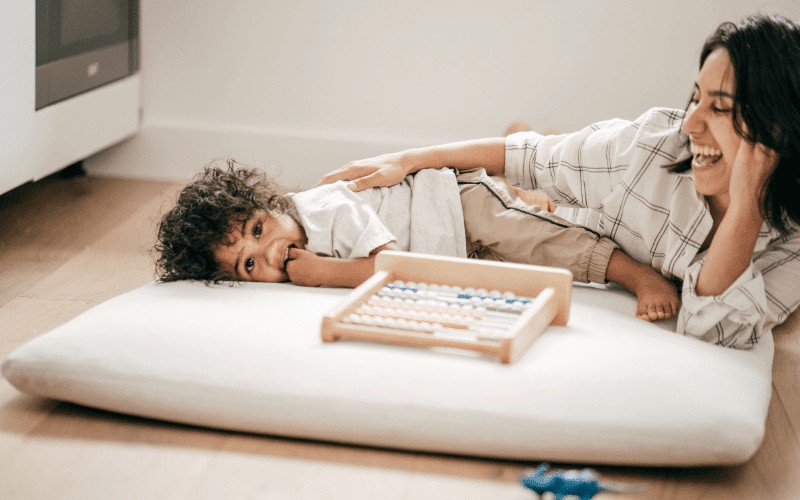One of the most common misconceptions that our society perpetuates is that baby sleep is linear, with our babies getting more and more sleep as they grow older. In reality, normal infant and toddler sleep have lots of ups and downs as our babies learn and grow. If you are an exhausted parent of a toddler who wakes through the night, you are not alone! It is very common for toddlers to wake up at night. Anxiety-related to separation is often at full force by toddlerhood, as is that lovely counter-will. If you are thinking of sleep training your 18-month-old, stop and read this first!
Why is my 18 month old waking up at night?
Sleep often “regresses” in the 12-18 month age group, though I like to think of these occurrences more as developmental PROgressions. Around 12-18 months, there are multiple reasons for night waking. These include:
- Changing sleep needs. Toddlers need 11-14 hours of sleep in 24 hours, which is less than when they were younger. If your toddler is sleeping too much during the day, night waking may be more frequent. They may also experience false starts, split nights or early rising. By 18 months, most babies are taking one nap a day in the afternoon.
- Discomfort related teething. Our baby’s first molars typically come in between 13 and 19 months of age. Many parents feel that these first molars appear to be the most painful for their toddlers, most likely due to their increased size and multiple edges.
- Separation Anxiety. Since separation anxiety starts around 8 months of age, you may think that your toddler should be done with missing you at night. The truth is that separation anxiety actually peaks in toddlers aged 14-18 months! Separation anxiety in toddlerhood is a great sign that your child has developed a secure attachment with you. It may feel worrying if your toddler only wants you, day and night. It is very normal during this age group to still prefer one primary caregiver.
Why is sleep training my 18 month old not the best idea?
If you are reading this article, chances are that you have either:
- Gotten to this stage without using any forms of sleep training
- Tried sleep training but it didn’t feel right to you or it didn’t “work” for your baby
- Sleep trained in the past but your toddler has started waking up again
Regardless of which camp you are in, I do not recommend sleep training for 18-month-olds. Actually, I don’t recommend sleep training at all! Why do you ask? Sleep training is not a skill that your baby needs to learn. Supporting your baby to sleep does not create a bad habit, either.
Night waking is very normal throughout your baby’s first few years of life. A recent study of 5700 Finnish children in 2020 found that sleep is highly variable up to 2 years of age. The number of babies needing resettling dropped dramatically after the first year of life. However, it was found that 25% of toddlers 1-2 years of age still needed help settling back to sleep at night. If your toddler is waking up through the night, you are definitely not alone!
I’m exhausted. What can I do instead of sleep training my 18 month old?
I know, I know. It is all well and good to say that night wakings are normal, but what can be done about your sleep deprivation? Sleep is super important for us all!
Although I don’t recommend sleep training techniques, I do support parents to make gentle, age-appropriate changes.
We know that separation anxiety peaks around 18 months of age. The answer for supporting toddler sleep is not pushing our children towards MORE separation. Pushing separation before our toddlers are ready causes them to feel more dysregulated, increasing cortisol levels. Sleep is a state at which we are the most vulnerable. In order to feel safe enough to fall asleep and stay asleep, we need to feel secure. As parents, we need to balance the needs of creating this security with setting age-appropriate boundaries.
Here are a few questions that I ask parents of toddlers:
- How much separation is there through the day? If your toddler is in daycare 5 days a week, they may be waking more at night in order to fill up their connection tank with you.
- Is your toddler getting enough to eat while awake? Toddlers still have tiny tummies, and need to eat small amounts at regular intervals. It may feel like you’re constantly making them food! Aim for 3 meals with 2 snacks. I often find that a bedtime snack can make a huge difference!
- Is there a reason why they are waking? This time frame is most commonly associated with molars coming in and a big growth spurt, which at times means more frequent night wakings for nursing babies.
- Have you considered night weaning? At this age, it is possible to begin the process of night weaning, provided that you have ruled out physical or emotional reasons for frequent nursing sessions at night. If you are looking for support with night weaning, I highly recommend the Isla Grace night weaning course (affiliate link – you get $15 USD off) Sometimes night weaning can help toddlers sleep longer stretches at night, though they most likely will still wake to make sure that their parents are there at night. Check ins are developmentally appropriate until school age.
- Have you started to establish age-appropriate boundaries? It is super important around the first year of life to start establishing clear boundaries. This allows your toddler to rest in your parenting abilities.
These are a couple of possible reasons that your 18 month old may be waking up at night. I hope that this article provides you with some further insights, and at least provides you with some reassurance that your parenting and your toddler’s behaviours are biologically appropriate. It can be very hard to know what to believe in this day and age, and when in doubt, I always recommend that clients listen to their inner guidance above all else. Take good care of yourself, because when you do, that investment also supports your child’s well-being. Wishing you all the best in your parenting journey.




0 Comments